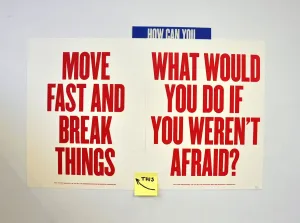
Last month, I had the pleasure of leading a session at Nairobi Tech Week, sub-Saharan Africa’s largest annual technology event. The theme of my session: how partners, investors, governments and startup ecosystem players can best enable and support tech startups to scale in Africa.

On behalf of the UK’s Dept. for International Development (DFID), Brink helps to manage a portfolio of 19 technology initiatives across 9 countries in East and West Africa: everything from sexual health chatbots in Kenya, to electric vehicles in Rwanda, to drones carrying tuberculosis samples in Mozambique.
Our work has given us insight both broad and deep into how best to support teams harnessing frontier technologies in Africa; below are the top 5 tips I shared with an audience founders, investors, government officials and other innovators. We’re fortunate enough to work with some of the most talented innovators around the world, at DFID and around the world— and proud to work with them to catalyse their ideas and work.
#1: Help startups achieve clarity on their growth assumption(s).
Inspired by lean startup (and more recently, lean impact), we work with our technologists to identify all the assumptions they’re making within their idea. This forms the backlog we work through with our time and money.
Having repeated this exercise many times, we’ve seen assumptions about growth are both generally overlooked and often most critical to future sustainability. By growth assumptions we mean: what’s the plan for growing once the pilot time and money run out?
Growth assumptions are where the startup ecosystem actors can get most directly involved. Asking and helping startups learn around questions like: is the policy and regulatory environment today or in the future going to enable us to scale? Is what we’re doing what investors want to see before putting money on the table? Do we have the right evidence to convince donors or governments to mainstream this technology? Even if the tech works in a pilot, is it fit for embedding into existing workflows and systems?
It’s our job to support startups by applying our experience and collective insight to get to a YES or NO as quickly as possible on growth assumptions like these.
#2: Create psychological safety before creating a plan
As a general rule, the technologists in our portfolio are doing something that has never been done before. Either the tech is completely novel, or it’s being applied in a completely new context.
With that said, we’ve often found that creating fixed plans at the outset constrains both a team’s thinking and action. The tools for planning relatively predictable projects — GANTT charts, risk registers, and so on — aren’t applicable when what you know at the start and what you come to learn by the end are so different.
Instead, we’ve come to realise the most valuable upfront work you can do is create an environment of psychological safety. This means people in a team speaking up, challenging norms, and empathising with diverse views.
All of this adds up to teams feeling confident enough to change their mind and learn as they go, without fear that this might be seen as being ‘wrong’. This is often hardest — but most important — when people are supporting you on your journey and have invested (personally, financially, reputationally) in you and your tech startup.
#3: Help startups make their progress fast, small and imperfect
In wanting to execute the ‘perfect’ pilot, we sometimes see our tech initiatives spend months in planning mode, waiting for all the pieces to line up before putting the technology out in the real world.
Often there’s good reason for this: for example, thinking through the ethical or knock-on implications of putting frontier tech in a new, high-stakes environment. Too often, though, this mindset inhibits quick learning about whether the idea will work. Perversely, the longer we see technologists planning an idea’s inception, the more wedded they become to it, and the less likely they are to respond to feedback when we eventually put the tech in the real world.
Investors, regulators and other ecosystem actors bring the psychological safety, perspective, and permissions to help this happen. We need to accept and encourage action in small, discrete chunks rather than big launches with perfect, shiny technologies.
One of my favourite examples of this from our portfolio is from our pay-as-you-go bicycles pilot in Zambia. Rather than waiting until the technology stack — solar lamps, mobile money, GPS tracking and a bicycle — was ready to implement, we created posters with the offer and price and circulated these to farming co-operatives with a display bike. This helped us get feedback, much more quickly and cheaply than otherwise.
#4: Never under-estimate the power of convening
As we’ve grown our portfolio over the last three years, the thing we’ve seen our pilots request more than anything else is to be connected to others working with the same tech or encountering the same problems.
Startup ecosystem actors tend to work with more than one startup. Whether you are a corporate working with different technologists, an investor with a diverse portfolio or an incubator with a range of clients, some of the best value we’ve seen has come from making connections between different startups. Partly this is practical — sharing expertise and stories — but a large part is the kinship of people sharing in the ambiguous and tumultuous journey of scaling tech.
We do this in a range of ways: in-person dinners to create regional clusters; Slack and Whatsapp groups to enable quick, easy communication beyond borders; and calls on specific issues. Our next call focuses on regulation: how can you influence regulators and key policy makers to the same side of the table?
#5: Think: how can we alleviate the big, hairy non-technical challenges to scaling tech?
The more Brink has worked with tech startups and initiatives in Africa, the more we’ve realised that the tech ‘working’ often isn’t the most important assumption for a particular idea to scale.
Rather, it’s the stuff around the tech — stuff that would enable it to flourish — that bites hardest when it doesn’t work: robust and reliable supply chains, local talent available to develop and maintain a tech solution, local awareness of technologies and how to use them, engaging with policy and regulation, and so on.
Brink has developed a Frontier Tech Playbook, which collates some of the smartest strategies our pilots have done to work through or around challenges like these. Read about how we worked with startups to lobby for special tariffs on 3D printers in Nepal, got regulators on the same side of the table in Mozambique, and held ‘town halls’ for our eWater taps in Tanzania.
With all said, a single start-up can only do so much in the face of a systemic challenge. It’s here that the birds-eye view and influence of corporates, investors, governments and other ecosystem actors can play a critical role in building up the systems and infrastructure for tech startups to scale.
I’ll leave the final words to one of the founders at my session.
It takes a village to raise a startup
When we get it right, the network of support for technologists can be a pivotal and truly powerful thing.
If you have any comments or thoughts on the above, please comment or drop me a line at [email protected]





